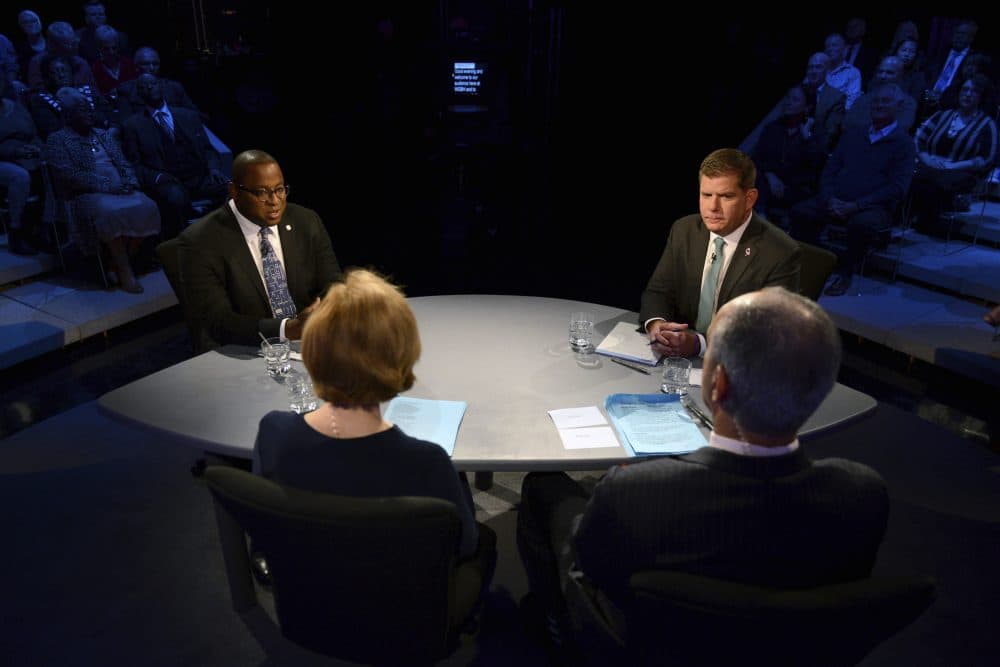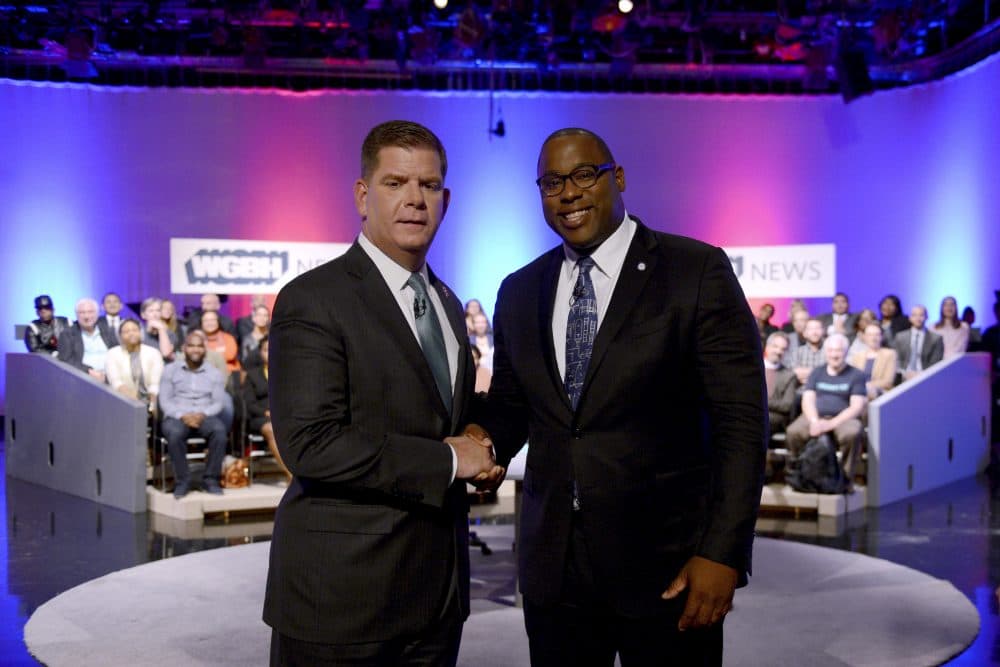Advertisement
Walsh, Jackson Spar In Final Mayoral Debate

In their final debate just two weeks before the election, the two candidates for mayor of Boston offered tales of two cities — two completely different tales.
Mayor Marty Walsh and the man who wants his job, City Councilor Tito Jackson, sparred again over affordable housing, economic disparity and race in the debate sponsored by WGBH Tuesday night.
Walsh made a case for a thriving city under his stewardship. Jackson found multiple ways to say Boston works well for some, but leaves too many people behind.
So they disagreed on just about everything, including what to do about the high cost of housing. A recent WBUR poll identified this as the top issue for Boston voters.
"Well, it's because the city of Boston is building way more luxury housing than actual affordable housing under the Walsh administration," said Jackson.
As mayor, Jackson said he would abolish the Boston Planning and Development Agency, which he calls "undemocratic." He said he would increase the percentage of affordable housing in which the city invests.

"Fifty percent of people make $35,000 or less. So the housing that Mayor Walsh is building that he says is affordable is not affordable for the people who actually need it," said Jackson.
"Just to set the record straight here a little bit, we don't build luxury housing. Developers do. Private developers build luxury housing," said Walsh.
Walsh insisted he is increasing the affordable housing stock. His administration has sped up the permitting process, and in the last three years, more than 13,000 new housing units have been built, many of them for low- and middle-income residents.
"We've invested in the last three years over a hundred million dollars into affordable housing. And this wasn't being built before," he said. "We weren't seeing private developers building moderate-low-income housing in the past, and we're seeing it in that area today. But we still have more work to do."
The candidates also clashed on the issue of race. Moderator Jim Braude brought up an accusation Jackson made in their last debate in Roxbury. Talking about racial tensions at the Boston Latin School, Jackson accused the mayor of not believing that black lives matter.
"So does he not believe that black lives matter?" Braude pressed Jackson. "You said it, not me."
"Well, you know what the issue is — whether or not he believes it or not — it's about his actions. And that's what this administration has had an issue with," replied Jackson.
He faulted the mayor for ordering studies on issues around race rather than trying to resolve them. He criticized Walsh for dismissing a report by the NAACP that gave the mayor low marks for responding to deep-rooted racial disparities in Boston.
Advertisement
"In Boston, a white family is worth $247,500," said Jackson. "A black family is worth $8. In my district alone, from Back Bay to Roxbury, there's a 33-year difference in life expectancy. ... the proof is in the pudding."
Walsh acknowledged that racial disparities remain entrenched in Boston, but he said these are challenges that go back generations and that he has a record of taking them on.
"Since I was mayor, and before I was mayor, I have never backed away on the question of race and making sure that we work on income inequality and racism in our city of Boston," he said. "We've made great gains in our city in a lot of different ways."
Walsh took credit for, among other things, expanding diversity in City Hall, among public school teachers and on the police force.
But again and again, Jackson attacked — hitting Walsh for pursuing the Olympics and Indy Car racing at the expense of working people, and for offering tax breaks to GE, but not enough money to the schools. Walsh pushed back, and took credit for new jobs, more housing, fewer homeless people and a AAA bond rating.
By the end of the evening, the race remained where it was at the start: an uphill climb for Jackson, who, according to a number of polls, is running far behind a popular mayor. Walsh has been endorsed by the Boston Globe and Herald, as well as by Sen. Elizabeth Warren.
Speaking to a crush of reporters after the debate, Jackson expressed frustration and blamed the press.
"I believe that we have run a strong campaign," he said. "I believe that you guys haven't covered it in the proper way. I believe that we need a press who's going to make us sit down and have these conversations, and I don't believe the press has actually done that."
Jackson wanted more debates, but the Walsh campaign said two was enough. So Tuesday night's parlay was likely their last face-to-face showdown before Election Day.
This segment aired on October 25, 2017.
